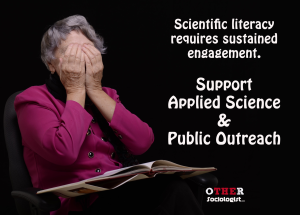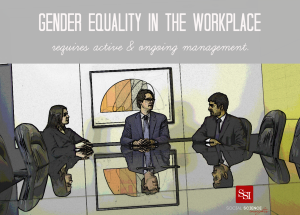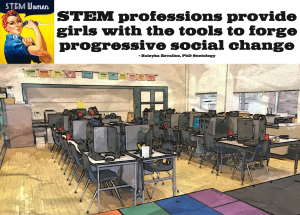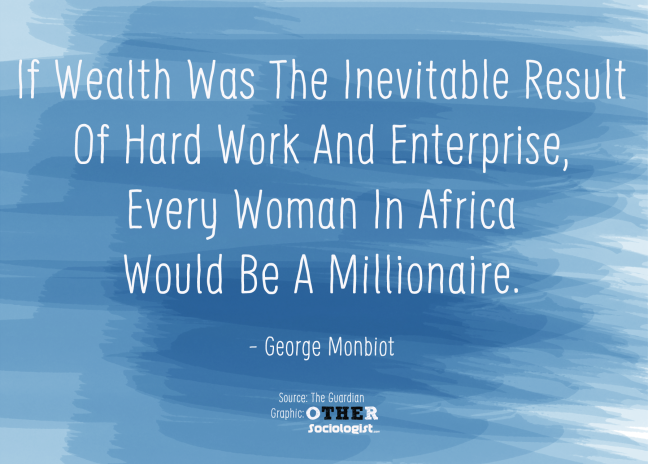I had always planned to use this website to collate my various writing and social media, to have them all in one place. I’ll now bring you a weekly update on my current writing as well as a look at past posts from my different blogs and communities. I’ll organise the articles based on themes. This week is focused on my sociological writing about women’s issues. First, an overview on what I’ve been writing lately.

Over on my research blog, The Other Sociologist, I’ve written about How Media Hype Hurts Public Knowledge of Science. I discuss how scientists can better support public education by critiquing poor science reporting in the news. A recent example involved the media reporting that most people think that astrology is a science. This “factoid” came from a large study by the American National Science Foundation, but the results were quoted out of context and needed scientific critique. The broader study actually shows that the public do not really understand what scientists do, how our research is funded and the outputs of our work. This lack of knowledge undermines the public’s general understanding and trust in science. I argued that more scientists can get involved in diverse outreach activities to support public learning. This is part of a long-standing series I’ve been writing on how to improve public science education. Read more my blog.

On Sociology at Work, I talked about How Sociology Class Discussions Benefit Your Career. I used this post to highlight how the group work we do during an undergraduate degree trains students for the types of activities they’ll carry out as applied researchers outside academia. This includes dealing with clients, running community consultations and thinking critically on our feet. Learn more.
The rest of this post is about my most recent writing on gender equality in business and in science and technology. Enjoy!
Supporting Women in Business

On my business website, Social Science Insights, I wrote about an international study of 240,000 workers which found that most women feel like they’re excluded from career development opportunities. The men in the study say they want to help women feel included, but they resort to chivalry, such as holding doors open and offering to pay for lunch. Women don’t need these gestures – they need management practices to change. I showed how social science can provide expert equity and diversity training to address these issues before they alienate employees and cause bigger problems. Social science also supports workplaces through evaluations of workplace relations, and coaching managers and staff to become more aware and proactive about gender issues at work. Learn more on How To Promote Gender Equality in Your Workplace.
More recently, I wrote about Why Women’s Leadership is a Business Asset. Social science research which finds that male bosses are more likely to judge the competence of women managers using a skewed view on gender. They see women’s focus on teamwork and consultation as weaknesses. I show that by misreading women’s management style, organisations are missing out on a proactive approach to leadership. I provide a list of useful steps that managers and Executives can use in order to improve their organisation’s management structure so it is more inclusive of women and more supportive of all genders. Learn more on my business blog.
Valuing Women in Science
In January, I joined the management team for STEM Women, a not-for-profit group that supports the careers of women in Science, Technology, Engineering and Mathematics (STEM). It’s been a busy but productive time. I designed our website and I make our graphics. We also run a fortnightly YouTube series where we interview women and allies who support gender diversity in STEM. We co-host the discussions and write articles on our blog.

We kicked off the new website with a series of posts about what inspired us to work in STEM. I wrote about what it was like for me as a new migrant in Australia starting primary school, and the three women teachers who supported my learning despite my initial language barrier. I also reflected on the children’s books that inspired my sociological imagination way back when I was just eight years old and had never heard of the social sciences. The “Value Tales” featured heroic women like the sociologist Jane Addams, anthropologist Margaret Mead, abolitionist and suffragist Harriet Tubman and educator Hellen Keller. Reading stories of activists who used education and science to improve their society helped me to see that girls, including those from minority groups who are denied rights, can and do make a positive impact on society. Read my story on the STEM Women website.
Coming up today, on Thursday 10th of April 7am Australian (EST), STEM Women will be co-hosting #ScienceChat, a discussion on Twitter. We will tweet as @STEMWomen, while other 10 scientists talk about equality and inclusion in STEM. The panel includes sociologist Jessie Daniels, science presenter Julia Wilde Modzilla Science Lab Director Kaitlin Thaney, academic blogger Dr Isis, amongst other guests. You can join our discussion using the hashtag #sciencechat.
On Monday the 14th of April at 730am (AEST), I’ll be co-hosting another STEM Women interview with roboticist Annika O’Brien. We’ll talk about her career and her efforts to support disadvantaged youth get involved in engineering. Join us on the day on our Twitter or Google+ or catch up later on our YouTube Channel.
That’s it for this week! My forthcoming blog posts will be shorter now that we’re all caught up and on a roll! Until next time, here is a quote by UK journalist, George Monbiot. He has a degree is in zoology, but his incisive critique of class inequality is worthy of sociology brownie points. Enjoy!
Sociology Quote of the Week: George Monbiot

Connect with me: @OtherSociology on Twitter.


One thought on “Sociology for Women”
Comments are closed.